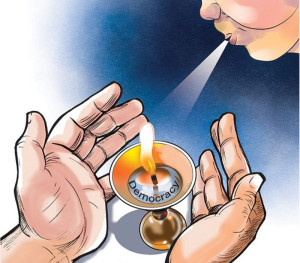Columns
How are we failing our daughters?
Parents have the biggest role to play in taking care of the mental health of their children.
Rojisha Shahi Thakuri
A woman’s sexuality has always been a matter of debate in Nepali society. Talking about sex is horrifying for many parents. We secretly hope and believe that our daughters can make wise decisions to not give in to their curiosity about sex before marriage. This belief is deeply engraved in our society, and we pass it on to our daughters through various behavioural and cultural means without actually having to talk about sex or sexuality. The rest of the world has moved past the concept of sexuality while women in Nepal have been struggling to keep up. With society grappling to accept this concept, Nepali women, especially teenagers, have been facing a new form of abuse—an abuse referred to as slut-shaming.
A 14-year-old girl who had been taking anti-depressants for over two years came to me for help. She fell into depression after constantly being slut-shamed by her friends for moving on to a second relationship swiftly after having a failed previous one. Many of her friends supposedly called her chhaada and uttauli. Another client, a 19-year-old girl, got married to her boyfriend after getting into a physical relationship with him as she was afraid of being called a slut. The guy now constantly cheats on her with other women, and she blames herself for getting stuck in a dead-end toxic relationship because she made a ‘mistake’ or, in her words, 'nagarnu galti garihaley'.
Biased views
I have seen many cases of teenage girls facing these slut-shaming abuses; but in my experience, I have hardly seen teen boys struggling with these issues. They are rather glorified by their peers for being able to flirt with more than one girl. The use of the term playboy or boka is prevalent among boys; it does not seem to produce the safe negative effect as the terms used to describe girls. It seems that the value of sex is higher for women than for men.
Moreover, I have experienced cases where girls were even scared to speak against the sexual harassment that they faced due to the fear of being called a slut. A 15-year-old who was sexually abused by her neighbour told me how she did not have the courage to speak up about it. She tried telling her friends who, rather than trying to help, put the blame on her for being 'provocative'. She now suffers from anxiety, and needs to take pills to cope with it.
All this unnecessary pressure and fear that society and parents put on their daughters to make sure they live according to social norms makes them more vulnerable to mental illness. I would briefly like to explain why this is a problem through humanist psychologist Carl Roger’s Theory of Self. This theory states that we humans see ourselves as a Real-Self and an Ideal-Self. The Ideal-Self is our perception of the self that we want ourselves to be. This self is true to their values, and is always good or right. The Real-Self is the present self, who we currently are and how others perceive us and how we ourselves perceive ourselves to be.
This perception of the present self might or might not have values similar to that of the Ideal-Self. When the Ideal-Self and the Real-Self do not match, we fall into a pit of despair. As we move into the grey areas of these two personalities, trying to grow into our ideal self, we face the struggle of figuring out who we really are and what we want to become. This becomes a turning point that determines our self-esteem. Lack of self-esteem is one of the most critical psychological stressors among people.
I work with teenagers on a daily basis, especially girls, and many of them struggle with this idea of the self to a point where it hampers their mental health. Their Real-Self wants to know more about sex; it wants to be in a relationship, and is open to the idea of engaging in sexual activity. Some teenagers are actually aware of how they feel about having sex, and they try hard to normalise these feelings. They understand that they are merely curious teenagers. They put their narratives in a way that makes their Real-Self look open-minded, acting as if engaging in sexual activities is not such a big deal.
Limited to women
On the other hand, the Ideal-Self they perceive is the ‘good girl’ society wants them to be. This ideal girl does not talk about sex, is not involved in any sexual activity, and is a virgin—pure until the day she gets married. When the terms 'good' and 'pure' are only linked to sex, and is only limited to women, then the struggle to become one’s Ideal-Self leads to severe emotional turmoil and conditions of mental illness. With the rise in the use of social media, many teenage girls also feel pressured to keep up with the global concept of women’s sexuality. But the cost of keeping up with such a concept in Nepal is fear and dilemma—and being referred to as sluts.
Parents have the biggest role to play in taking care of the mental health of their daughters. As parents, it is our responsibility to talk to our teenage daughters about sex, make them aware of society’s double standards on sexuality, and prepare them to face social pressure without feeling bad about themselves.
We should make sure they know the appropriate age to indulge in sexual activities as well as the appropriate safety measures. These conversations can get awkward and can go wrong in many ways, but it is extremely vital. Likewise, we as parents must constantly learn to communicate with our children with more compassion and grace. We should always try to include them in making collaborative decisions instead of just giving them orders. Lastly, we must teach our children the right values; not the values governed by society, but values that lead to their mental and physical well-being.




 7.12°C Kathmandu
7.12°C Kathmandu















